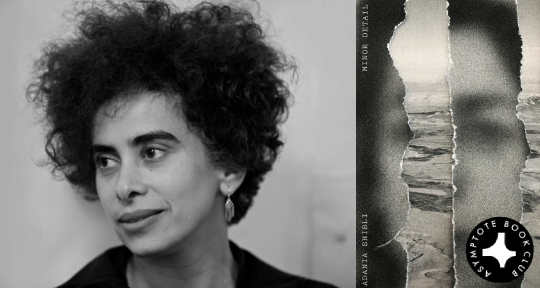As thousands of Palestinians protest against Israel’s newly announced annexation plans for significant parts of the West Bank and Jordan Valley, Adania Shibli’s haunting, persistent novel, Minor Detail, seems especially potent as our May Book Club Selection. The text is written in two parts: the first is set in 1949 and details a horrifying act of violence committed by Israeli soldiers, while the second takes place during present day, in which another young woman discovers the crime and makes a place for it within her own life. As Palestinians continue to struggle in turmoil, Shibli’s masterful language transposes the past into now, in a profound recognition of violence and its intricate legacies. In the following interview, Daniel Persia speaks to the translator of Minor Detail, Elisabeth Jaquette, about how she has rendered this powerful narrative for English-language readers.
The Asymptote Book Club aspires to bring the best in translated fiction every month to readers around the world. You can sign up to receive next month’s selection on our website for as little as USD15 per book; once you’re a member, you can join the online discussion on our Facebook page!
Daniel Persia (DP): Time seems crucial to our understanding of Minor Detail, both in terms of its historical context and the passing of events. Can you talk a little bit about time in translation—how it’s expressed in the Arabic language, and whether this presents any challenges when thinking about English tenses or ways to recreate stillness and movement?
Elisabeth Jaquette (EJ): Time often poses challenges for me as a translator working from Arabic to English, but oddly enough this book didn’t pose particular conundrums in that regard. With other books, I’ve found that English publishing has a greater expectation that readers be able to place events on a precise timeline in relation to one another, whereas that’s somehow less crucial in the Arabic book. In Minor Detail, I felt that the reader’s sense of time was constructed less through events or tense, and more through repetition, pacing, and tone. In Part I in particular, there’s a somewhat paradoxical contrast between dates being directly stated: “9 August 1949 . . .Before noon, 10 August 1949,” and so on, and the way that the officer’s repetitive, enumerated actions make one day bleed into the next, creating stillness even though the passing dates are marked. In Part 2, I also felt that tone and voice, and especially narrative digression, were central to the reader’s sense of movement.
DP: The scene in which Israeli soldiers capture and hose down the young Arab woman is, I think, one of the novel’s most haunting. What was it like to translate this kind of trauma? Does a scene like this demand more of you as a translator—not only technical skill, perhaps, but something like emotional resilience?
EJ: In the face of such traumatic scenes, should we understand readers as bearing witness, or as implicated onlookers? Translators, like writers of course, are more intricately involved: a translator recreates the scene word-by-word in English, actively crafting it. The scene where the soldiers hose down the girl, and her subsequent rape, were certainly the most raw for me. There is tension between the emotional trauma of the actions and the matter-of-fact way in which they is narrated, and I consciously worked to maintain that impassivity at the level of language, following the Arabic’s choice of neutral words, even though the emotional impact of these scenes is high. In some ways I felt that the distanced style of narration amplifies the horror, because the girl is all the more isolated in what she endures. READ MORE…



